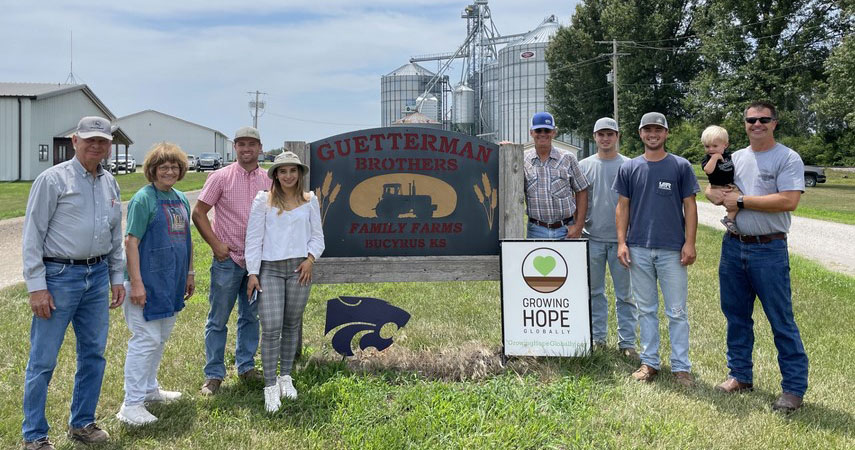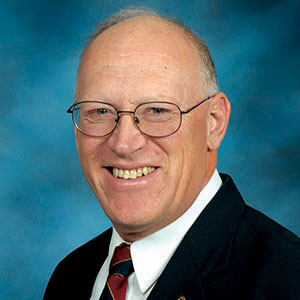
The family of Paul and Rosie Guetterman farm near Bucyrus, Kansas. The family has been participating in the program, Growing Hope Globally, since 2001. | Download this photo
Kansas Profile – Now That’s Rural: Kaylyn Morse, Growing Hope Globally
At a glance: Kaylyn Morse serves as regional director for Growing Hope Globally, a faith-based charity working to support agricultural development around the world. It is supported by people such as the Guetterman farm family of Bucyrus, Kansas and others.
More information: Ron Wilson, rwilson@ksu.edu, 785-532-7690
Photos: Ron Wilson | Paul and Rosie Guetterman Family
Website: Huck Boyd National Institute for Rural Development
Aug. 21, 2024

By Ron Wilson, director of the Huck Boyd National Institute for Rural Development at Kansas State University
The congregation is in place as the pastor says a prayer. But there are no pews or stained glass windows in sight. In fact, this service doesn’t take place inside a church building - it takes place in a cornfield.
This congregation is saying a blessing over a plot of farm ground from which the proceeds will be used to support a global initiative helping farmers in developing nations fight hunger.
Kaylyn Morse is regional director for Growing Hope Globally, a Christian nonprofit organization working to support agricultural development in developing nations around the world. Kaylyn is a Colorado native. She and her husband Tobin came to Manhattan when Tobin took a position as an engineer with the Natural Resources Conservation Service in Riley County. “We love it here,” Morse said.
In 2022, she joined Growing Hope Globally. Morse explained that the organization began in 1999 with some Ohio corn farmers who wanted to do something to fight world hunger, so they figured they would ship some of their corn overseas.
They learned two things: One, the cost of shipping was 10 times the value of their grain. And two, dumping grain in those countries would disrupt markets for local farmers.
They sought a more constructive solution. They recognized that the long-term solution to fight hunger would be to support agricultural development – specifically, to help local farmers improve their production – in these developing countries. They formed an organization that would use U.S.-raised crop proceeds to support agricultural development overseas.
This organization is now known as Growing Hope Globally. Among other things, it operates through locally sponsored “Growing Projects” that raise funds for international work. The international ag development programs are operated by partner organizations such as Catholic Relief Services, Lutheran World Relief, Mennonite Central Committee, Presbyterian Church USA, United Methodist Committee on Relief, and more.
An example of a local growing project is one begun by Kansas farmers Paul and Rosie Guetterman in 2001. They farm near the rural community of Bucyrus, population 171 people. Now, that’s rural
“We were very impressed because (Growing Hope Globally) was not a handout, but a teaching program,” Rosie Guetterman said. The Guettermans joined with friends and family to establish a growing project to support Growing Hope Globally.
This has become a multi-generational project. Paul and Rosie’s sons and grandchildren have joined the farm and continue to support Growing Hope Globally each year.
As regional director, Morse is responsible for this and other growing projects in four central U.S. states. She hopes to see these expand. Growing projects are sponsored by churches, farmers, FFA chapters and other groups.
Morse said she seeks to match funders with projects that align with funder goals. She also leads U.S. groups to see overseas projects, and vice versa.
Overseas, Morse is responsible for agricultural development activities in the Caribbean, and Central and South America. “In those countries, our partners support local organizations with local staff to do the training for farmers,” Morse said. “They work together, hands on with the farmers on farmer field schools and demonstration plots.”
Some projects include cooperative marketing or saving and lending communities.
“Agricultural development is our focus, but community development is embedded in this,” Morse said. “We get into issues about water, sanitation, small business, empowerment of women and other things.”
She is proud of the impactful, long-term results of these projects. “We estimate that the Bucyrus project alone has helped more than 22,000 people,” Morse said.
Growing Hope Globally currently has 109 growing projects in 19 states. Along with other funders, these projects are supporting 45 agricultural development programs in 31 countries. Those programs are now helping more than 200,000 people find lasting solutions to hunger.
For more information, see www.growinghopeglobally.org.
It’s time to leave the cornfield where the pastor concludes his prayer with a blessing of the seed and a call for a fruitful harvest. We commend Kaylyn Morse, the Guetterman family, and all those involved with Growing Hope Globally for making a difference in the lives of people around the world.
They are not just raising crops. They are raising hope.
Audio and text files of Kansas Profiles are available at www.huckboydinstitute.org/kansas-profiles. For more information about the Huck Boyd Institute, interested persons can visit www.huckboydinstitute.org.
***

K‑State Research and Extension is a short name for the Kansas State University Agricultural Experiment Station and Cooperative Extension Service, a program designed to generate and distribute useful knowledge for the well‑being of Kansans. Supported by county, state, federal and private funds, the program has county extension offices, experiment fields, area extension offices and regional research centers statewide. Its headquarters is on the K‑State campus in Manhattan. For more information, visit www.ksre.ksu.edu. K-State Research and Extension is an equal opportunity provider and employer.